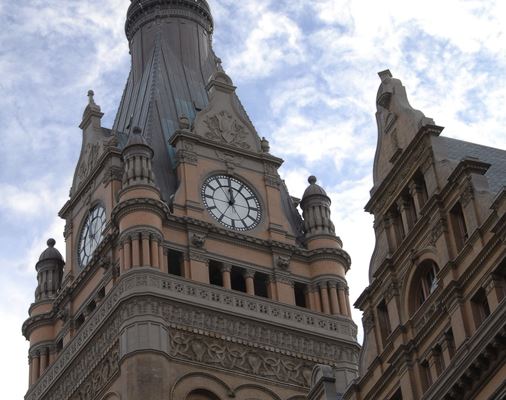10 Curious Details in City’s 2019 Budget
A city store? No more alley repairs? Cutting tree trimming? The $1.5 billion budget has it all.
The Milwaukee Common Council approved the city’s amended 2019 budget Tuesday. The $1.53 billion budget now heads to Mayor Tom Barrett for approval or line-item vetoes.
We covered the big details yesterday, including the fact that the budget decreases the property tax rate from $10.75 to $10.57, but still raises property taxes and fees on the average homeowner by $51.88.
The budget also maintains police and fire staffing levels and includes $20 million in lead abatement programs.
But beyond those high-level items, there are a lot of small details buried in the budget. Here the 10 best things that stood out in the 2019 budget.
1. Footnotes
The council’s budget amendments were loaded with policy or program requests inserted as footnotes. The items include everything from requesting the city departments use more cost-effective, open source software to finding a way to give city employees a one percent raise. City employees shouldn’t rush out to spend that pay increase, though. The budget as passed funds a two percent raise for most city employees, but the council’s additional one percent raise, championed by Alderwoman Chantia Lewis, is merely a suggestion that the Department of Employee Relations should find a way to fund it. As multiple council members pointed, the footnotes do not carry the weight of law.
2. Tree Trimming
There are a lot of policy changes buried in any budget. A subtle one in the 2019 city budget is to change the tree pruning schedule from every eight years to every 10 years. One unintended consequence of the change could be more trees falling into city streets during storms. Or an increase in calls to 286-CITY to fix dangerously dangling branches. Or things could be perfectly fine. Only time will tell, and until then, watch that Elm tree grow.
3. Bublr Bikes Subsidy
A budget amendment, introduced by council President Ashanti Hamilton, granted $110,000 in city cash to non-profit, bike sharing system Bublr Bikes. The amendment doesn’t state explicitly what Bublr is to use the cash for, but the organization has announced plans to expand its service in 2019 to a broader area of the city.
The amendment passed on a 10-4-1 vote. Joining Murphy in opposition were Cavalier Johnson, Robert Donovan and Mark Borkowski. Newly-elected Nikiya Dodd abstained.
The funds would come from retained earnings from the city’s transportation fund (formerly the parking fund).
4. $105.7 Million in Real Dollars From State
In 2003 the city received $249.90 million from the State of Wisconsin in shared revenue payments. In 2018 the city received $228.20 million. A substantial, but not destructive change, until inflation is factored in. That $21.7 million deficit becomes $105.7 million, or roughly the cost of the entire Milwaukee Fire Department.
The century-old shared revenue practice is intended to return a portion of income and sales tax proceeds to the community in which they were generated. But the state has repeatedly cut the figure to balance its own budget since 2003 when an automated formula was switched to a fixed figure. A similar budget problem exists for Milwaukee County and municipalities across the state, but it’s becoming particularly acute for the revenue-restricted city.
5. The Milwaukee Store
One council-inserted footnote includes the City Clerk setting up a city merchandise retail outlet within six months. The measure is sponsored by Lewis and Alderwoman Milele A. Coggs. Lewis said the inspiration arose from the desire to be able to give out coffee mugs to special guests. City Clerk Jim Owczarski said his department’s second story office has space to accommodate a small store, but don’t expect to see merchandise flying off the shelf immediately. The unanimously-adopted amendment states that the council will likely need to adopt subsequent legislation to create the store.
If the council would like to save some time, they’re welcome to walk over to Urban Milwaukee: The Store and purchase any number of Milwaukee-made gifts we sell.
6. The Failure of Act 10
Outgoing Governor Scott Walker‘s defining policy achievement will likely be the implementation of Act 10. The act, which decimated public unions and reduced take-home pay for most government employees, had one carveout that is still hammering the city. The act exempted “public safety” employees including police officers and firefighters, whose unions had endorsed Walker’s gubernatorial run.
The police and fire departments are two of the biggest aspects of Milwaukee’s budget. The police department’s $295 million budget is larger than the city’s $281 million levy. The fire department has a $111 million budget in 2019. The city, which contributed $83 million to pensions last year, saw 77 percent of the annual cost of pension benefits accrue to retired police officers and firefighters.
If Walker was really interested in saving cities money, instead of decimating his political foes, he wouldn’t have exempted public safety employees.
7. $5.1 Billion in Tax-Exempt Properties
One reason the city has in recent decades looked to fees instead of property taxes to generate revenue is the staggering number of tax-exempt properties. In 2018, the Assessor’s Office reported there are 9,908 tax-exempt properties valued at $5.1 billion. If those properties, which includes everything from city-owned homes and homeless shelters to storefront churches and voucher schools, paid taxes at the proposed 2019 rate, it would generate an additional $53.9 million in revenue.
8. Cooperate/Work With
The most absurd thing to happen during Tuesday’s budget adoption meeting was Alderman Russell W. Stamper, II‘s objection to the language in his own amendment. Stamper said the drafting of his amendment, creating a MKE Community Excellence Fund to promote peace and violence prevention, included the phrase “cooperate with” when he meant “work with.”
A quick check of Thesauras.com indicates that “cooperate” is a synonym of “work with.” But despite eye rolling from a number of his colleagues, Stamper got his way. The council had to vote twice, once to suspend the rules and a second time to alter the amendment’s language.
The Legislative Reference Bureau used the word “cooperate” six times in drafting amendments. No one else objected.
9. $0 For Alleys
The city has budgeted $0 for alley reconstruction in 2019, down from $900,000 in 2018 and $800,000 in 2017. Ald. Robert Bauman isn’t pleased with the change, and introduced an amendment to borrow $500,000, levy $10,000 and use special assessments for $200,000 to replace up to seven alleys throughout the city. The alderman said he fears the city becoming like Detroit, where the city has in effect given up and many alleys have become impassable.
He didn’t find enough support from his colleagues for his proposal. “What happens when you keep borrowing more money is you make next year’s budget more difficult,” said Ald. Michael Murphy. He said with or without the change, the city has a “455 year” replacement cycle for its alleys. “I look forward to the day we don’t have to debate about infrastructure compared to other pressing financial needs,” added Coggs. Murphy and Coggs were joined in voting no by council president Ashanti Hamilton, Johnson, Nik Kovac, Lewis, Terry Witkowski and Tony Zielinski.
10. The Inspector General
We previously reported that the council had created the position of the Inspector General, even defying a mayoral veto to do so. The supposedly non-political position would be housed in the council-controlled City Clerk’s office.
What they didn’t do was fund it. Now they have, at least until the mayor vetoes the funding. Led by Ald. Donovan, the council voted 10-3-2 to allocate $24,335 to pay six months of salary to the position. Joining Donovan were Hamilton, Kovac, Bauman, Khalif Rainey, Lewis, Borkowski, Jose G. Perez, Zielinski and Stamper. Coggs and the newly-elected Dodd abstained without explanation.
If you think stories like this are important, become a member of Urban Milwaukee and help support real independent journalism. Plus you get some cool added benefits, all detailed here.
More about the 2019 Milwaukee Budget
- Council overrides mayoral veto of COP house initiative - Ald. Milele Coggs - Nov 28th, 2018
- Common Council Overrides Mayor’s Veto on Amendment Tackling Neighborhood Blight - Ald. Bob Bauman - Nov 27th, 2018
- City Hall: Council Slaps Down Mayor’s Vetoes - Jeramey Jannene - Nov 27th, 2018
- City Hall: Barrett Issues 5 Budget Vetoes - Jeramey Jannene - Nov 26th, 2018
- City Hall: 10 Curious Details in City’s 2019 Budget - Jeramey Jannene - Nov 14th, 2018
- City Hall: Council Adopts 2019 City Budget - Jeramey Jannene - Nov 13th, 2018
- City Hall: Barrett Unveils 2019 Budget Proposal - Jeramey Jannene - Sep 25th, 2018
Read more about 2019 Milwaukee Budget here
Political Contributions Tracker
Displaying political contributions between people mentioned in this story. Learn more.
- October 30, 2019 - José G. Pérez received $200 from Tony Zielinski
- September 17, 2019 - Cavalier Johnson received $200 from Terry Witkowski
- December 13, 2018 - José G. Pérez received $50 from Mark Borkowski
- March 31, 2018 - Bob Donovan received $50 from Mark Borkowski
- March 28, 2016 - Michael Murphy received $100 from Terry Witkowski
- March 26, 2016 - Chantia Lewis received $50 from Nikiya Dodd
- March 26, 2016 - Chantia Lewis received $50 from Nikiya Dodd
- February 20, 2016 - Cavalier Johnson received $250 from Robert Bauman
- January 13, 2016 - Ashanti Hamilton received $20 from Nikiya Dodd
- January 4, 2016 - Russell W. Stamper, II received $20 from Nikiya Dodd
- December 30, 2015 - Milele A. Coggs received $20 from Nikiya Dodd
- November 19, 2015 - Robert Bauman received $50 from Terry Witkowski
- October 8, 2015 - Cavalier Johnson received $50 from Terry Witkowski
- September 21, 2015 - José G. Pérez received $50 from Terry Witkowski
- September 8, 2015 - Bob Donovan received $50 from Mark Borkowski
- May 7, 2015 - Nik Kovac received $10 from Cavalier Johnson
- May 5, 2015 - José G. Pérez received $10 from Cavalier Johnson
City Hall
-
Council Blocked In Fight To Oversee Top City Officials
 Dec 16th, 2025 by Jeramey Jannene
Dec 16th, 2025 by Jeramey Jannene
-
Latest Effort to Adopt New Milwaukee Flag Going Nowhere
 Dec 3rd, 2025 by Jeramey Jannene
Dec 3rd, 2025 by Jeramey Jannene
-
After Deadly May Fire, Milwaukee Adds New Safety Requirements
 Dec 2nd, 2025 by Jeramey Jannene
Dec 2nd, 2025 by Jeramey Jannene























Good wrap up. Points 4 and 6 are especially salient.